CIA Sponsored Terror, Civil Liberties, Criminalizing Dissent, Cuba, Habeas Corpus, Human Rights, NSA Spying, Political Prisoner, Supreme Court, Surveillance, Targeting Muslims, Torture, Truth to Power
Podcast: Play in new window | Download
Updates:
- President Barack Obama Lies About NSA Bulk Collection and Retention of Personal Metadata.
- Der Spiegel Reports on U.S. Spies On Huawei Telecommunications in China
- New York Times Reports That U.S. Spying on China Is In Retaliation From China Spying
- Michael Ratner: New York Times Spin Is Ridiculous In Justifying Spying
—-
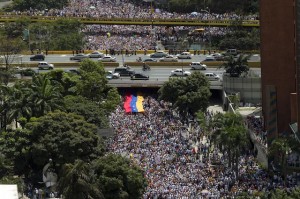
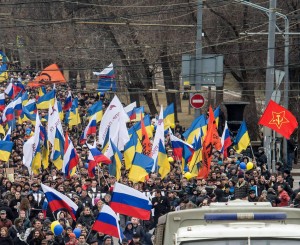
Obama’s Ukrainian Power Grab, Sanctions and the Boomerang Effect
The unfolding of the US-EU-Russian conflict over the Ukraine will have far reaching consequences and will ultimately define the global configuration of power. While the Western power grab was largely ignored, the US-EU propaganda machine kicked into gear, focusing on Russia’s defensive action in the autonomous region of Crimea. The citizens of Crimea organized a self-defense militia and pressured the Putin administration to help protect them from armed incursions by the NATO backed coup regime in Kiev. We’re joined today by returning guest Professor James Petras who has written several articles on the crisis in the Ukraine. He identifies it as the most recent cycle of US empire-building in a 3 phase system including Eastern Europe, Latin America, Africa and Asia.
Professor James Petras:
- The U.S. according to UN Sub-secretary of Foreign Affairs stated it very clearly. We’ve poured 5 billion dollars into the Ukraine building up organizations and politicians who are favorable to NATO and the European Union and hostile to Russia and eager to oust it from the bases in the Black Sea.
- I think it was a long term project in building client organizations there, mainly in terms of electoral politics in the beginning.
- So you have a target of a vassal state building and encircling Russia in line with what happened through the Baltics through central Europe and into the soft underbelly of Russia.
- At the same time this is going on Russia is cooperating with the U.S. in many spheres including the over-flight caper in Libya, supporting the sanctions in Iran,
- You have on one hand Washington aggressively encircling Russia, Russia essentially cooperating with the U.S. to gain good merit points, hopefully to get accepted in the G8.
- Two thirds of the so called Ukraine Army decide to stay in Crimea as an annex state of Russia. This is a fact that tells you something about the hostility they feel to the people that grabbed power in Kiev.
- The Russian threat that’s been manufactured has to do with the fact that in southern Ukraine there have been massive demonstrations against the coup makers.
- What they’re doing is reenforcing repressive authority against the internal opposition which is hostile to the coup.
- The internal opposition now doesn’t want to join Crimea but do want a federal structure in which they elect their own governors and legislators and not be forced to accept oligarchs in line with the EU policies.
- I think its clear its to encircle Russia and return Russia to the status of the 1990s.
- With the rise of Putin you have a semblance of a state once more. You have a political economic order which is functioning which has raised living standards which allows Russia to play a modicum of political role in world politics in particular the border area.
- Venezuela: Democratic protesters don’t burn down 500 businesses and installations administering social welfare programs.
- Democratic protesters don’t assassinate 7 national guard and policemen trying to maintain order.
- Democratic protesters don’t blow up electrical grids and light up the national forests in a 360 degree circumference.
- Kerry is lying, the U.S. is supporting violent terrorists. Those people that are engaged in this activity are engaged in trying to overthrow the government by force and violence. They resorted to this because they lost the last 10 elections in Venezuela including a resounding defeat this last December.
- They’re going for a civilian based terrorist operation which they (U.S.) will hope will precipitate a military coup.
- The New York Times is a propaganda organ for the U.S. government whenever there is a serious conflict particularly from a left wing or progressive government.
- The New York Times has not shown any of the charred buildings that the so called democratic protesters have burned down.
- They haven’t shown the experimental school that was blown up in Tachira, Venezuela.
- Let’s be clear Michael, the targets of the terrorists, not a single U.S. business has been effected. Not a single major bank has been effected.
- This is profoundly a class war directed against anti-imperialist communities.
- China holds 3 trillion dollars in U.S. treasury notes. All the major 500 U.S. corporations are involved with China. It’s very much linked into the production chain of goods that go from Asia to China to the U.S. Walmarts, etc.
- On the other hand Washington is very concerned with not being able to compete with China in world markets.
- The Chinese have displaced the U.S. in Latin America, in the Asian field.
Guest – Professor James Petras, author of more than 62 books published in 29 languages, and over 600 articles in professional journals, including the American Sociological Review, British Journal of Sociology, Social Research, and Journal of Peasant Studies. He has published over 2000 articles in nonprofessional journals such as the New York Times, the Guardian, the Nation, Christian Science Monitor, Foreign Policy, New Left Review, Partisan Review, TempsModerne, Le Monde Diplomatique, and his commentary is widely carried on the internet.
——
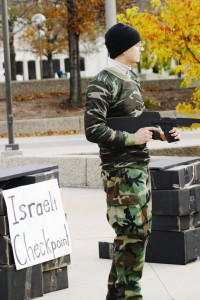
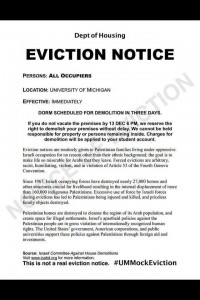
Boycott Divestment Sanction Awareness Gains Traction On University Campuses
Members of the group Students for Justice in Palestine at Northeastern University in Boston were disciplined and banned from serving on the inaugural board of the new organization plus their members must attend a university-sanctioned “training.” This is one of 50 cases of repression the SJP has documented across the country in universities since 2013. As the SJP gains momentum, it faces aggressive campaigns to shield Israel from public scrutiny. The repression campaigns are driven by organizations such as the Anti-Defamation League, the Zionist Organization of America, StandWithUs, the Amcha Initiative, American for Peace and Tolerance and the Bradneis Center. Recently the Northeastern University School of Law chapter of the National Lawyers Guild had publicly declared support for the Northeastern chapter of the SJP and formally opposes the administration’s decision to suspend the group and sanction its members.
Attorney Dima Khalidi:
- We started Palestine Legal Support a little over a year ago.
- The major backlash has been on campuses because that’s where the activism is most vigorous and spirited.
- What we’re seeing is a lot of effort by students, even academics to raise awareness about the Israel – Palestine issue.
- There’s also a lot of movement around Boycott, Divestment Sanction. The BDS movement is really growing and I think that’s been the case since 2008-2009 with Operation Cast Lead.
- We’re seeing students doing a lot of awareness raising, unique and creative things.
- We’re seeing things like mock walls to illustrate what the apartheid wall is doing.
- We’re seeing things like mock eviction notices being distributed in dorms to illustrate the way Israel demolishes Palestinian civilian homes.
- We’ve working with Northeastern students since last year. This year when students, some affiliated with SJP distributed mock eviction notices under dorm room doors, the university, right away, suspended the entire group.
- The reaction is typical but its unique in the type of pressure that’s been put on this university.
- The reaction was disproportionate and inappropriate.
- They sent university police to student’s homes, they interrogated a couple of students. They filed disciplinary charges against 2 students for allegedly allowing students to enter the dorms.
- Title IV of the Civil Rights Act prohibits discrimination on the basis of race, national origin and color by educational institutions.
- This has been used by Jewish groups to allege that universities are discriminating Jewish students by tolerating a hostile anti semitic environment.
- Accusations of anti semitism underlie this backlash. We saw this with mock eviction notices in several places, at Florida Atlantic University last year. The ADL accused the SJP of targeting Jewish students with these notices saying they only put them under Jewish student’s doors.
- The same accusations at Rutgers, that Jewish students were targeted.
- The burden has fallen on those advocating for Palestinian rights.
- What sustains us is really the activists themselves who are really inspirational in their dedication to this issue.
- There are number of student groups that are trying to pass divestment actions at their schools and there’s a sustained attack and we know that Netanyahu himself has said this is a prime threat to the state of Israel.
Guest – Attorney Dima Khalidi, founder and Director of Palestine Solidarity Legal Support (PSLS), and Cooperating Counsel with the Center for Constitutional Rights (CCR). Her work includes providing legal advice to activists, engaging in advocacy to protect their rights to speak out for Palestinian rights, and educating activists and the public about their rights.
———————————————————————-
Afghanistan War, CIA Sponsored Terror, Civil Liberties, Criminalizing Dissent, Cuba, Extraordinary Rendition, FBI Intrusion, Guantanamo, Habeas Corpus, Human Rights, Political Prisoner, Surveillance, Targeting Muslims, Torture, War Resister
Podcast: Play in new window | Download
Updates:
- A Phone Call To Save Lynne Stewart’s Life:
- Attorney General Eric Holder – 1 202 514 2001
- White House President Obama – 1 202 456 1414
- Federal Bureau of Prisons – Director Charles Samuels – 1 202 307 3198 ext 3
—-
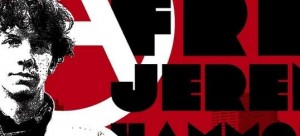

Jeremy Hammond, Bradley Manning and Julian Assange: Michael Ratner
Michael Ratner discusses attending Jeremy Hammond guilty plea in open court last month, Bradley Manning’s trial that starts June 3, 2013 at Fort Meade and how a Fox News reporter feels the same chilling effect of free speech by having his investigative work under suspicion as co-conspirator or aiding and abetting.
Jeremy Hammond: “Now that I have pleaded guilty it is a relief to be able to say that I did work with Anonymous to hack Stratfor, among other websites,” according to a statement released by Hammond on Tuesday. “Those others included military and police equipment suppliers, private intelligence and information security firms, and law enforcement agencies. I did this because I believe people have a right to know what governments and corporations are doing behind closed doors. I did what I believe is right.”
- Jeremy Hammond pleaded guilty to one count of conspiracy to access a protected computer.
- It’s under the Computer Fraud and Abuse Act.
- Jeremy Hammond was facing 32 years to life. He could be sentenced to up to 10 years.
- Interestingly, Wikileaks doesn’t appear in what he pleaded to. He or the group uploaded some 5 million emails.
- One of the emails is about a sealed indictment on my client and CCRs client Julian Assange.
- Julian Assange: Jeremy is a political activist and whistle-blowing is one of the means he uses for political activism.
- Bradley Manning pleaded guilty to 20 years in prison already. The key crime they’re trying to get Bradley for is aiding the enemy.
- The government is sledge hammering any criticism from a military person.
- Petition for Jeremy Hammond
Law and Disorder Co-host Attorney Michael Ratner, President Emeritus of the Center for Constitutional Rights (CCR), a non-profit human rights litigation organization based in New York City and president of the European Center for Constitutional and Human Rights (ECCHR) based in Berlin. Ratner and CCR are currently the attorneys in the United States for publishers Julian Assange and Wikileaks. He was co-counsel in representing the Guantanamo Bay detainees in the United States Supreme Court, where, in June 2004, the court decided his clients have the right to test the legality of their detentions in court. Ratner is also a past president of the National Lawyers Guild and the author of numerous books and articles, including the books The Trial of Donald Rumsfeld: A Prosecution by Book, Against War with Iraq and Guantanamo: What the World Should Know, as well as a textbook on international human rights.
—–
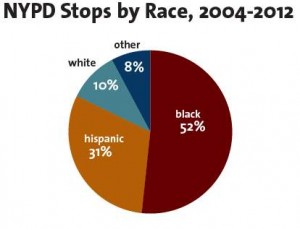

Stop and Frisk Lawsuit Closing Arguments
Closing arguments were heard on both sides last week on the Stop and Frisk case known as Floyd v. City of New York. This is a class-action lawsuit challenging the NYPD’s unconstitutional stop-and-frisk policy. The case charges the NYPD with a policy and practice of unreasonable, suspicion-less and racially discriminatory stops in violation of the Fourth Amendment’s prohibition against unreasonable searches and seizures and the Fourteenth Amendment’s Equal Protection Clause barring racial discrimination.
Stop and Frisk has increased over 600 percent in New York City. In 2009 New York City, a record 576,394 people were stopped, 84 percent of whom were Black and Latino residents — although they comprise only about 26 percent and 27 percent of New York City’s total population respectively. Ten years of raw data obtained by court order from the New York City Police Department (NYPD) showed that stop-and-frisks result in a minimal yield of weapons and contraband.
CCR Senior Staff Attorney Darius Charney:
- The closing was really interesting because the judge asked a lot of questions of both sides.
- It was more like an oral argument as you would do in an Appeals Court.
- This was a bench trial, there was a judge but no jury.
- Because of that the judge herself took the role of asking a lot of questions of witnesses.
- I think the police departments’ at least public position on this is really a problem created by a bunch of left wing lawyers and the media.
- In our class action (8 years) there have been over 4.5 million recorded stops by the police department but the actual number of stops are probably higher. About 90 percent of that 4.5 million there is no discovery of criminal activity – 90 percent are released and not given a ticket.
- The police department claims the focus of this program is to get illegal guns off the street about .13 percent results in the recovery of a gun.
- You actually find a gun one or two times out of a thousand.
- Reasonable, articulatable suspicion which the Supreme Court set out about 45 years ago – Terry v Ohio.
- (NYPD) they were very frank about it and sincere when they said – Look most reported crime is black or latino suspect
- If you’re talking about individualized suspicion just because someone happens to be the same race as crime suspect doesn’t make them suspicious.
- The two most common reasons these police officers are checking off on the forms for why they stop people is furtive movements and high crime area.
- They’ll try to muddy the waters by trying to mischaracterize what it is we’re actually complaining about. How can you criticize us for sending more police officers to high crime neighborhoods.
- What we’re complaining about is how officers behave there and how they treat the people who live there.
- Opening statements: It’s difficult to try to synthesize that much evidence into an hour and a half.
- This fight really goes back 14-15 years to the late 90s and what happened after the murder of Amadu Diallo.
- The first lawsuit that they did, the Daniels Case came about because of the work of grassroots organizations.
- Communities United For Police Reform
- We anticipate by July we will know what she (the judge) will decide.
- We learn the lesson if you leave it up to the police department and this mayoral administration to change things on their own, they’re not going to do it because they think what they’re doing is right.
Guest – Attorney Darius Charney, senior staff attorney in the Racial Justice/Government Misconduct Docket. He is currently the lead counsel on Floyd v. City of New York, a federal civil rights class action lawsuit challenging the New York Police Department’s unconstitutional and racially discriminatory stop-and-frisk practices, and Vulcan Society Inc. v. the City of New York, a Title VII class action lawsuit on behalf of African-American applicants to the New York City Fire Department which challenges the racially discriminatory hiring practices of the FDNY.
—
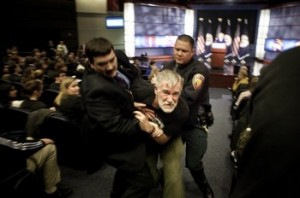
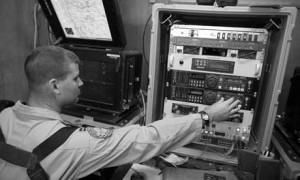
Doubting Obama’s Resolve To Do Right: Ray McGovern
We continue our discussion on killing people using drone warfare with returning guest Ray McGovern. When President Obama delivered a major speech on counter-terrorism, he announced a shift in his administration’s use of drones. The Obama Administration has conducted hundreds of drone strikes in several countries, killing civilians and so far reported, four US citizens. Critics point out that as the Obama Administration assassinates its’ suspects, it also avoids the legal complications of detention. London based bureau for investigative journalism estimates that about 830 civilians including women and children may have been killed by drone attacks in Pakistan. 138 in Yemen, and 57 in Somalia.
Former CIA analyst Ray McGovern:
- It was a masterpiece of oratory and rhetoric, but it was deceptive through and through.
- Those of us who had been watching this know he lied through his teeth on many occasions.
- He has the power as we all know to release 86 prisoners (Guantanamo) in the next hour.
- Why would he do all that? Why would he be afraid to take the drones away from the CIA?
- Well, I’ve come to the conclusion that he’s afraid. He’s afraid of what happened Martin Luther King Jr.
- At a small dinner with progressive supporters – after these progressive supporters were banging on Obama before the election . . . Why don’t you do the things we thought you stood for? Obama turned sharply and said Don’t you remember what happened to Martin Luther King Jr.?
- I’m convinced the President of the United States is afraid of the CIA.
- Does he have any reason to fear the CIA? Well he sure as heck does. For those of your listeners who have not read James Douglas’ JFK and the Unspeakable, you need to read that, because it’s coming up on 50 years.
- John Kennedy signed 2 executive orders just a month or so before he was killed. One of them said we’re pulling out a 1000 troops from South Vietnam. The other said we’re pulling out the bulk of the troops by 1965, we’re finished in Vietnam.
- I think he’s just afraid and he shouldn’t have run for president if he was going to be this much of a wuss.
- My father was professor of law at Fordham University for about 35 years. My daughter, my brother, their all lawyers. I have this notion that when someone comes in after building a record against torture and kidnapping, and black sites, and they come in and say we think this is bad but nobody should be prosecuted for it. .
- It’s not a dichotomy here, it’s deliberate duplicity with a rhetorical flourish.
Guest – Raymond L. McGovern, retired CIA officer turned political activist. McGovern was a Federal employee under seven U.S. presidents in the past 27 years. Ray’s opinion pieces have appeared in many leading newspapers here and abroad. His website writings are posted first on consortiumnews.com, and are usually carried on other websites as well. He has debated at the Oxford Forum and appeared on Charlie Rose, The Newshour, CNN, and numerous other TV & radio programs and documentaries. Ray has lectured to a wide variety of audiences here and abroad. Ray studied theology and philosophy (as well as his major, Russian) at Fordham University, from which he holds two degrees. He also holds a Certificate in Theological Studies from Georgetown University.
————–
Law and Disorder March 3, 2010
JFK and the Unspeakable: Why He Died and Why It Matters by Jim Douglass
Jim Douglass:
- John F. Kennedy’s experience in WWII: He was in the South Pacific, he volunteered. He was on that PT boat.
- What happened on that PT boat, is that it got split into two by a Japanese destroyer. He lost brothers and friends at that time. An extraordinary experience being adrift on the ocean warning other PT boats. The experience create a distrust in military authority.
- He said that he wanted to splinter the CIA into a thousand pieces and scatter to the winds.
- As Kennedy said to his friends, “they figured me all wrong.”
- The Unspeakable: the kind of evil and deceit that seems to go beyond the capacity of words to describe. The midst of war and nuclear arms race, the assassinations of Kennedy, Martin Luther King and Malcom X that the term was used.
- JFK’s vision is articulated in the address June 10, 1963, arising from the turnaround of the missile crisis and Bay of Pigs.
- He wanted to move step by step into a disarmed world. Nikita Khrushchev put that speech all over the Soviet Union. The Cuban Missile Crisis is a deeply misunderstood part of our history, because it’s usually portrayed as Kennedy going to war with Nikita Khrushchev and beating him.
- The truth was that Kennedy and Nikita Khrushchev were in over their heads, the US generals wanted nuclear war, because they had more warheads than the Soviets.
- Nikita Khrushchev: We now have a common enemy from those pushing us toward war.
- At that point the Cold War turned upside down because Kennedy and Khruschev became closer to each other than either was toward their own military power system.
- Vietnam: Kennedy’s military people would not give him an exit policy. He signed the withdrawal order from Vietnam before he was assassinated.
- His friends said that he had an obsession with death. It was not an obsession but a real assessment that he was going to die. If you try to turn around a national security state that is dominating the world,
- and you do so as president of the United States, of course you’re going to die. Kennedy knew that.
- The book is a story on the deliberate destruction of hope, the vision of change, a turning of this country all of which was happening and had to be stopped. US Agencies killed Dr. Martin Luther King – 1999 Verdict
- We’re in the same scene right now with Petraeus and McChrystal setting up Obama. They were dictating terms to Obama, unlike Kennedy, he did not face them down.
- We need to get out ahead of Obama so that he can do something.
Guest – James W. Douglass, author and longtime peace activist.
————————————————————
Civil Liberties, Cuba, Human Rights, Supreme Court, Truth to Power
Podcast: Play in new window | Download
Updates:
- MOMA Suggested Donation Lawsuit
—-

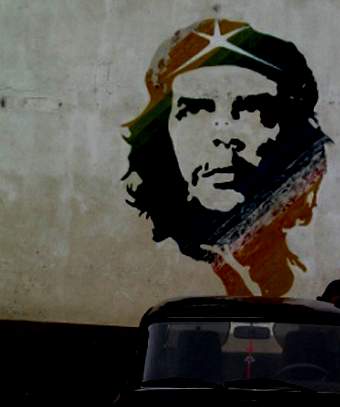
Michael Smith and Dennis James Discuss Cuba Trip
Co-host Michael Smith and attorney Dennis James recently returned from Cuba on a trip led by the Center for Cuban Studies. Dennis is a civil rights lawyer formerly of Detroit and former Executive Director of the National Lawyers Guild. The trip was undertaken to appreciate the fundamental changes now going on in Cuban law with respect to travel, home, car and business ownership. The discussion leads into the possibilities of an economic rejuvenation in Cuba.
Attorney Dennis James:
- The people of Cuba had a strong identification with the revolution they made.
- Cuba is theirs and nobody else is going to tell them how to run it.
- They have a lot of complaints about shortages, but they’re very appreciative of the basic needs of life that are provided for.
- The Cuban government did a thorough and multi-level canvassing of the population through its national assembly and committees for the defense of the revolution.
- Talking to the people on the street, they remember this process that went on.
- The government watches which enterprises make sense, which ones are succeeding.
- The ones that are succeeding and paying taxes, employing people are encouraged.
- Book: The Man Who Loved Dogs
- Book: Cuba, What Everyone Needs To Know – Julia Sweig
- There’s a colony of people in Melia Cuba that practice what they call naive art.
- I think its naive in the sense that it’s self taught.
- They do wonderful paintings, these are doctors, lawyers, bakers, bus driver, cops, sugar mill workers.
- Their work is encouraged, given exhibits in Havana.
- Sandy Levinson – The Center for Cuban Studies.
- We’re not talking about the flag waving, hammer and sickle brandishing socialist realism of China and Russia, we’re talking about wonderful expressions of culture.
Guest – Dennis James, a civil rights lawyer formerly of Detroit and former Executive Director of the National Lawyers Guild.
——–
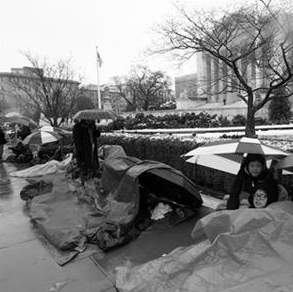
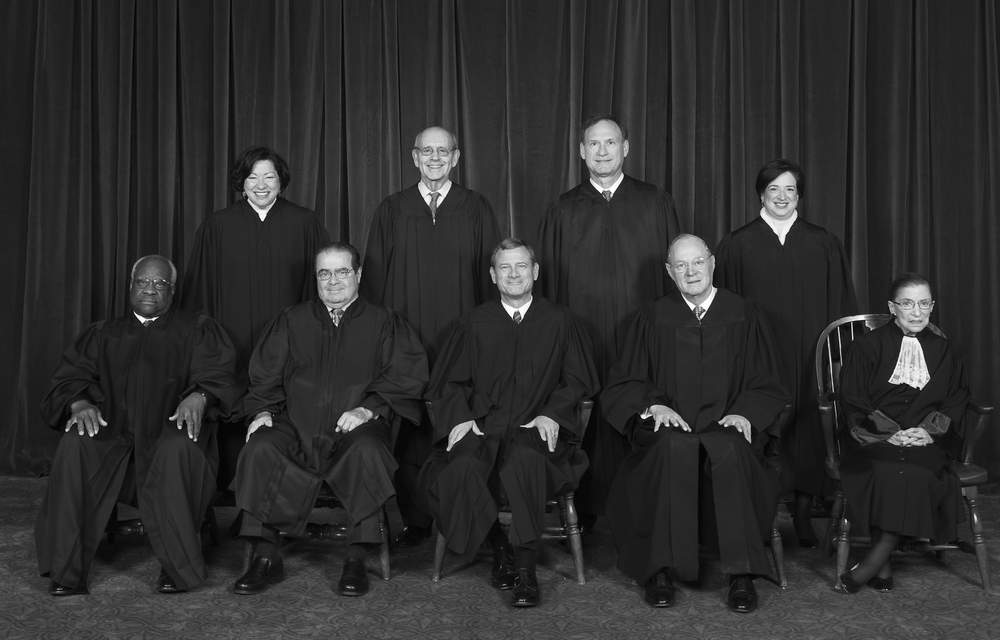
Supreme Court On Gay Marriage
Last week the Supreme Court heard oral arguments on two historic cases that could establish the constitutional right for gay marriage. The first case, Hollingsworth v. Perry is a challenge to California’s voter-approved ban of same-sex unions in 2008. Six months after the California Supreme Court endorsed gay marriage, voters passed Proposition 8 which amended the state’s constitution to only recognize marriages between a man and a woman. Lower courts had declared the gay marriage ban to be unconstitutional. The second case the Supreme Court heard was a challenge to the 1996 Defense of Marriage Act. This act bars married gay couples from receiving federal marriage benefits such as Social Security and family medical leave.
Professor Katherine Franke:
- On the Prop 8 case, I would certainly question the issue of standing which the court is from their argument also taking quite seriously.
- It’s actually an incredibly important issue in civil rights law where groups of people want to assert an interest in an overarching public issue like the right to marry.
- I’m of the view that this should never have been brought.
- The movement lawyers really argued for Boise and Olsen not to bring the case. Boise and Olsen lobbied quite hard to keep the movement lawyers out of the case.
- When the law gets out ahead, and the lawyers get out ahead of the movement that support them, often we do more damage than good when we get to the Supreme Court too soon.
- We have movement lawyers in the lesbian and gay community and of course they don’t all agree with each other, its a complicated movement. But there was a sense that they were going to go state by state, and build legal consensus around the issue of marriage rights and around a set of arguments that weren’t going to hurt gay and lesbian people who didn’t marry.
- Boise and Olsen thought they would do a better job raising the issue of marriage than the movement lawyers have. They’re carrying a brief for marriage, not a community who have a diverse set of interests, marriage being only one of them.
- DOMA, the Defense of Marriage Act is a law that unfortunately President Clinton signed in 1996. It was basically a homophobic cry from the Congress to limit on the federal level any definition of a marriage to between a man and a woman.
- If you’re a federal employee, if you’re married you can put your spouse and dependent children on you health insurance.
- If you’re not married, you can’t.
- Edie Windsor is the plaintiff in the DOMA case but when her partner of many many years past away, Edie inherited under the will, her partner’s property they jointly owned together. Under federal tax law it says if they were strangers to one another, so Edie had to pay about 360 thousand dollars in inheritance taxes for the property she had owned with her partner.
- There was a coalition of large corporations that filed a brief and said actually
- The political alignment on this issue has really shifted at a rapid pace in the last year.
- I direct our center on gender and sexuality law.
- I’m actually now teaching for the first time a class on the law of occupation so we’re looking at Iraq and Palestine and the United States, Puerto Rico and Hawaii. To understand whether the law can be a force for good when military force is like the Israelis or like the Americans occupying other sovereign states.
- We’ve got a really great new project engaging tradition and thinking about arguments based in tradition, that have been used traditionally to undermine sexually based justice claims.
- Those issues come up in the marriage context all over the place.
Guest – Professor Katherine Franke, the Isidor and Seville Sulzbacher Professor of Law; Director, Center for Gender and Sexuality Law at Columbia Law School.
—————————————————————–
Civil Liberties, Criminalizing Dissent, Cuba, Human Rights, Iraq War, Targeting Muslims, Truth to Power
Podcast: Play in new window | Download
Updates:
——–
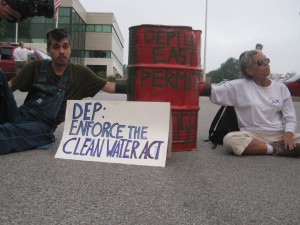
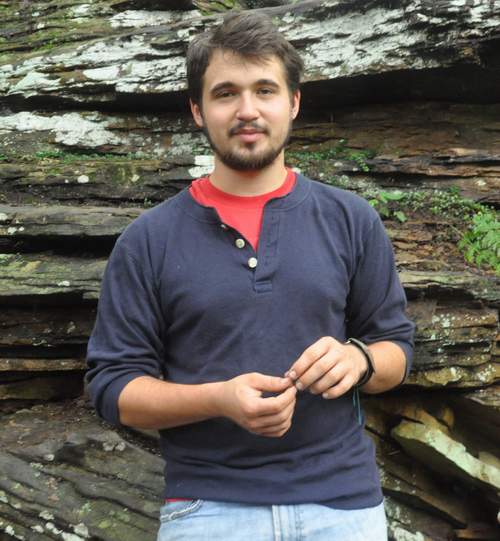

Climate Ground Zero – Update with Jimmy Tobias
We get an update from Mountaintop Removal activist Jimmy Tobias. Jimmy was arrested this summer with others for using direct action to shut down a coal mining mountaintop removal effort in Virginia. He was held on a 3500.00 bail and later released. A New York Times editorial states that movement to slow down and stop the mountaintop removal mining in that area is gaining traction and the Obama Administration is restricting permits for mountaintop removal mining. Recent Action.
Jimmy Tobias:
- I’m in Rockcreek, West Virginia where the campaign houses are located. The campaign houses have a big role, but there a million other things people work on.
- At the moment we’re gearing up for a mass mobilization in Washington, that will take place between the 25 and the 27 of September. Appalachia Rising. We’re focused on bringing national attention to the issue.
- I’ve been loathe to put my faith in the EPA to solve these problems. Their actions have been really ambiguous. They go back and forth and its really hard to get a sense of the ultimate outcome of their actions (EPA)
- My passion is for the local organizing, because that will make it or break it basically. We have four campaign houses, a big outdoor kitchen, everyone eats together, organizes together, works on different aspects of the campaign. The civil dis-obediance campaign is called Climate Ground Zero.
- Coal River Mountain Watch, Sludge Safety Project, Mountain Justice.
Guest – Jimmy Tobias, activist and direct action protester against Mountaintop Removal.
———–
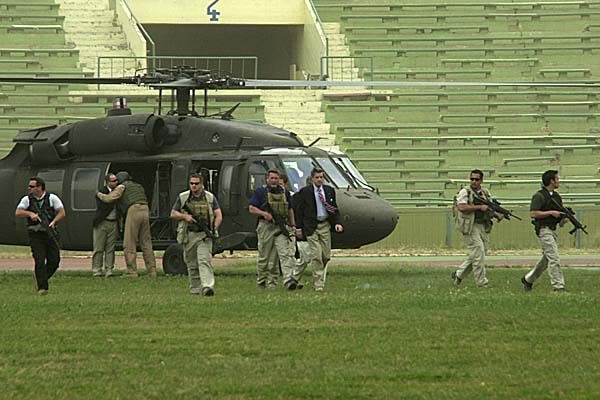
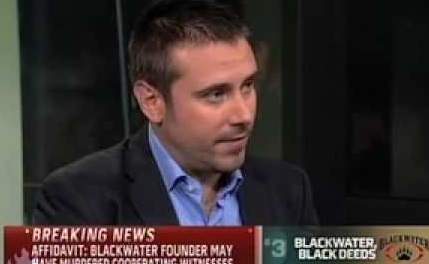
Blackwater Reaches Deal on U.S. Export Violations
The private security company formerly called Blackwater Worldwide has reached an agreement with the State Department for hundreds of violations of US export control regulations. The company now called US Training Services will pay the US government 42 million dollars in fines to avoid criminal charges on export violations. Violations include shipping weapons to Iraq hidden inside containers of dog food. There are other legal troubles facing Blackwater officials, but the company continues to obtain government contracts. Last June, Blackwater was awarded a 120 million dollar contract to provide security at a State Department regional office in Afghanistan and the CIA renewed the firm’s 100 million dollar security contract in Kabul.
Jeremy Scahill:
- This is a company that has been repeatedly involved with criminal activity, with murder and has gotten off scott-free. It has been shielded by its handlers at the State Department or at the DOD.
- The idea that this company can pay what amounts to 146 thousand dollars per violation is outrageous.
- The real meat of it is the murder they’re involved with, the human rights violations.
- What would it take for this company to be completely knocked off the US Government payroll?
- US operations in Afghanistan now, have become so dependent on Blackwater, both in the CIA and State Department. Eric Prince, the owner of Blackwater who has since fled to the United Arabs Emirates, which has no extradition with the United States. He moved there after five of his top deputies were indicted on conspiracy and weapons charges. This is a man who knows where the bodies are buried, he was working for the CIA, for the Joint Special Operations Command. They (Blackwater) could reveal details of action that would horrify the average American if they knew this was being done in their name.
- After 9/11, Eric Prince cut a deal with the number 3 man at the CIA, Alvin Buzzy Krongard. Find Fix and Finish Operation.
- There are also cases of I’ve heard of Blackwater working inside of Syria.
- Two former Blackwater employees, a man and a woman, the man worked in war zones, the woman worked on the financial side. They have filed a whistleblower case against Blackwater, alleging extrajudicial killings and bilking US taxpayers. Susan Burke recently deposed Eric Prince.
- Blackwater is involved with secret assassination programs in countries around the world, where we aren’t at war, where we aren’t informing those countries.
- The only serious challenges to Blackwater, aka Xe, aka US Training Services are people like Michael Ratner and Susan Burke. Bill: Stop Outsourcing Security Act.
Guest – Jeremy Scahill is the author of the international best-seller Blackwater: The Rise of the World’s Most Powerful Mercenary Army. He is a frequent contributor to The Nation magazine and a correspondent for the national radio and TV program Democracy Now! He is currently a Puffin Foundation Writing Fellow at The Nation Institute. Scahill has won numerous awards for his reporting, including the prestigious George Polk Award, which he won twice. While a correspondent for Democracy Now!, Scahill reported extensively from Iraq through both the Clinton and Bush administrations.
——————–
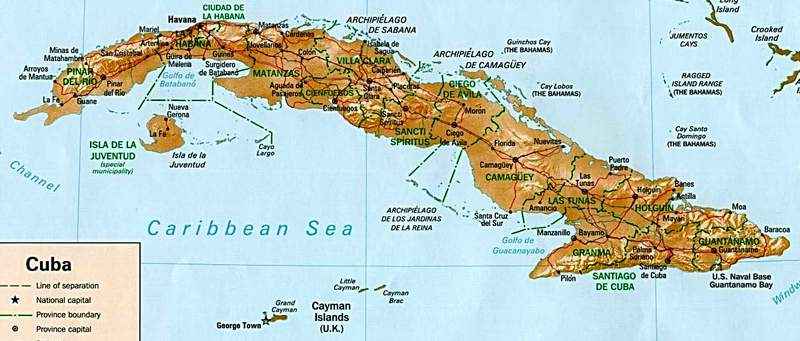
Cuba Travel Ban
Will the Obama Administration come to a decision on how much to enable travel to Cuba. The Administration could simply reinstate President Clinton’s policy which is a costly case by case application or grant general licenses to the remaining 11 categories of travel to Cuba. General license would include schools, cultural institutions, Chambers of Commerce, religious bodies, World Affairs Councils, humanitarian organizations and more.
Sandra Levinson:
- The travel regs are not really travel regs. They are regulations set up by the US Treasury Department at the instigation of the US State Department. You can’t spend money in Cuba.
- President Carter lifted the travel ban, there were direct flights to Cuba during the brief time he was president.
- During the Clinton Administration, we were able to take a number of trips. Ban in effect for a number of rationales, we don’t wanna give money to Castro. It always surprised me that William F. Buckley was in support of ending the travel ban to Cuba.
- We can always do professional trips. I’m leading a trip for professional artists.
- Lawyers traveling to Cuba fall under the general license, it’s by assertion. You simply say as legal professionals you’re doing legal research.
- We’ve been to Cuba so much, our travel is not formal, it’s intimate.
- Although the food and medicine embargo was lifted several years ago, the regulations about payment are so tough on the Cubans, everyone else can buy on credit. The Cubans can’t, they have to buy up front, before a ship leaves US territory with the food, with the medicine.
- I fell in love with Cuba, I arrived on July 4, 1969. I was there for six weeks. Socialism with salsa.
- On the fifth day of my first trip, Fidel Castro taught me how to cut sugar cane. I think he is the one of the smartest leaders we’ve had in this hemisphere. I think he’s been in power that long, because we have not had relations with Cuba.
Guest – Sandra Levinson, Executive Director of the Center for Cuban Studies in New York City and Director of the Center’s Cuban Art Space. Facebook link
——————————————————















